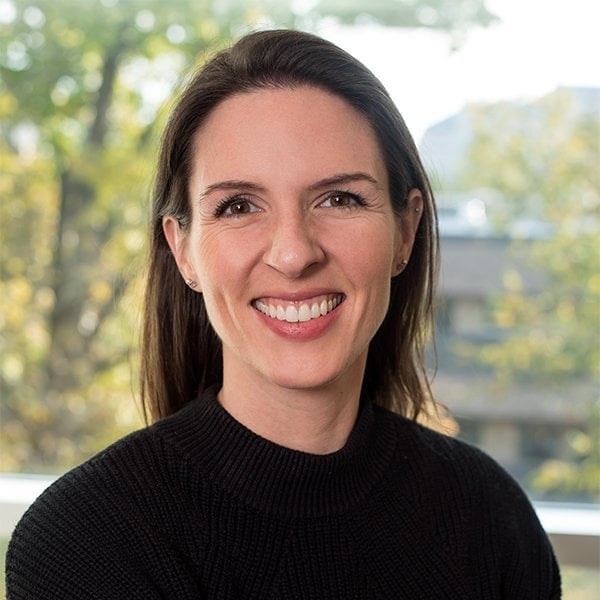
Trainee Spotlight: Lauren Zimmaro, PhD
-
Lauren A. Zimmaro, PhD
Postdoctoral Associate
Dr. Jennifer Reese’s lab
Fox Chase Cancer Center
[email protected]Biography
“Stress is a part of life.” It seems that many of us are taught this message from a young age, but few of us have been taught how to effectively cope with the ubiquitous nature of stress. Instead, there is often a societal message that we should thrive off of stress – even at the expense of our physical and mental well-being. These issues have been the driving force in my academic and clinical career: understanding the mind-body relationship during times of stress, particularly to understand how it can work for us or against us, and how best to intervene.
While I had childhood dreams of becoming a marine biologist, veterinarian, or something along the lines of working with animals in the great outdoors, I found that my curiosity about how people think, feel, and relate to each other and the world eventually outweighed my interest in solely studying animals. This change of heart was largely due to taking fascinating psychology classes with several bright and interesting professors during my time as an undergraduate student at Wake Forest University (Winston-Salem, NC), where I earned a Bachelor’s degree in Psychology with a minor in Biology in 2010. While working for several years as a post-graduate research assistant in a neuropsychology lab at the Children’s National Medical Center in Washington, DC, I developed a keen interest in the intersection of health and psychology, which prompted me to pursue my Master’s and Doctorate degrees in Clinical Psychology at the University of Louisville in Louisville, KY. There, under the mentorship of Sandra Sephton, PhD, my research and clinical interests focused on biobehavioral pathways of stress and the utility of mindfulness and acceptance-based therapies for coping with one of the most well-known stressors – cancer. Motivated to continue my training in psycho-oncology, I then completed my clinical internship at the Duke University Medical Center where I specialized in Medical Psychology, before joining Fox Chase Cancer Center as a postdoctoral fellow in 2018. As a Philadelphia native, pursuing postdoctoral training at Fox Chase not only offered an opportunity to be closer to family, but to expand my training into a unique domain of psycho-oncology (sexual health), all while experiencing the supportive, collaborative, and intellectually-stimulating environment that Fox Chase is known for.
Under the mentorship of Jennifer Reese, PhD, I currently serve as the site therapist for her multisite clinical trial on a behavioral intervention for sexual concerns of couples facing breast cancer, and have collaborated with her on other projects including understanding and improving patient-provider communication about sexual concerns. Given the stressful nature of sexual and relationship issues stemming from experiencing cancer and the mind-body connection that is innate to sexual health, my training at Fox Chase thus far has been a fascinating extension of my own budding program of research on stress and coping among cancer patients. As a registered yoga instructor as well, my career goals are to continue clinical psychology research in the oncology field, with a focus on developing and testing mind-body interventions such as mindfulness for coping with the myriad stressors that cancer patients and their families face.
Research Overview
My research is broadly focused on stress, coping, and quality-of-life issues relevant to cancer patients. One of the most common and distressing concerns that many cancer survivors face is the negative impact of the disease and its treatment on their sexual health. In the case of breast cancer, chemotherapy and hormonal treatments can lead to menopausal types of symptoms (e.g. vaginal dryness, discomfort or pain during sexual activity, loss of sexual desire), and breast cancer surgeries such as mastectomies can often incur changes in breast sensation and appearance, which can negatively impact sexual arousal and body image. Despite the common and distressing nature of these changes due to breast cancer, many women report that they do not discuss these concerns with their cancer provider, even if they would like to do so. The result is that women are left to deal with cancer-related sexual concerns on their own, often without clear information, resources, or an understanding of their treatment options. Promoting communication about sexual health between patients and their cancer providers may help address this issue, by leading to helpful clinical discussions and solutions to the often treatable sexual challenges that women face after breast cancer.
In an effort to understand why patients with breast cancer rarely discuss their sexual concerns with their provider, we explored questionnaire data collected from 144 women with breast cancer who were enrolled in a sexual health communication intervention. In particular, women completed questionnaires on the different thoughts and beliefs they held that may serve as barriers to discussing sexual concerns with their provider. They also completed questionnaires on their level of confidence in discussing sexual health and general health concerns with their providers (i.e. self-efficacy), as well as how confident they were that those discussions would lead to helpful solutions (i.e. outcome expectancies). They also answered questionnaires on socio-demographic and medical characteristics (e.g. race/ethnicity, disease stage), their current degree of sexual concerns, and psychological distress. From these data, we developed research questions to determine: (a) the underlying types of thoughts/beliefs that women hold regarding discussing sexual health with their provider, and (b) when women are grouped based on the extent to which they endorse these beliefs, do they differ by socio-demographic/medical factors, sexual concerns, or distress as well?
First, through an exploratory factor analysis, we found two underlying types of barriers women perceived: (1) women’s own thoughts or feelings that could impede them in discussing sexual issues with their providers (which we named “self-centered barriers”, and (2) women’s beliefs about their providers’ reactions to discussing sexual health (which we named “provider-centered barriers”). Interestingly, most women viewed their own discomfort in discussing sexual concerns as the bigger barrier to discussing these issues with their providers. Second, through a cluster analysis, we found that women largely fell into three groups based the degree to which they endorsed these beliefs: women who endorsed (1) both high self-centered and provider-centered barriers, (2) low self-centered and low provider-centered barriers, and (3) high self-centered barriers but low provider-centered barriers. Women who endorsed more perceived barriers also endorsed lower self-efficacy and outcome expectancies, but did not differ on degree of sexual concerns or distress.
Overall, the fact that barriers to sexual health communication largely pertained to patients’ own perceived lack of ability or comfort as opposed to that of their providers could come as welcome news to breast providers in considering whether to raise the topic of sexual health with their patients. The findings also speak to the importance of developing tools that equip women with breast cancer to feel more comfortable, skilled, and self-efficacious in discussing their sexual concerns with their provider.
Featured publication
Zimmaro, L. A., Lepore, S. J., Beach, M. C., & Reese, J. B. (2020). Patients' perceived barriers to discussing sexual health with breast cancer healthcare providers. Psycho‐Oncology, 29(7): 1123-1131.

